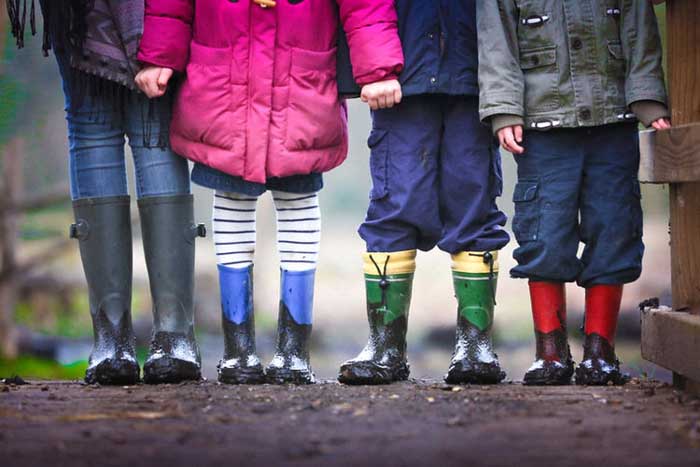Teach Kids to Cope with Bullying
As parents prepare their little ones for the school they understandably begin to be concerned about them being bullied – and they are perfectly entitled to, since bullying, according to statistics, affects every third child. The sad statistics aren’t showing any improvement.
From troubling middle grades, bullying has seeped even into lower grades, and now it’s up to us adults to be able to know when bullying is at work and what to do to stave it off.
What makes kids want to bully others?
The reasons behind bullying are multiple. Bullies are often on the lookout for victims, either those who are weaker or those who are not like others. By victimizing them they can feel as if they had a whip hand, were bigger than life, feared and popular. Some of them are stronger than kids they get at, but sometimes the strength is emotional.
Also, children who have been tormented are apt to treat others in the same fashion. If they grew in an environment where family members habitually vent their anger on others they have learned to be invariably rude and use derogatory names. There are shows on TV that support nasty attitudes where people can be given a wide berth or even picked at because of the way they look or behave.
What can children do to gain control of the situation and remain self-assured?
The obvious thing is to avoid the offender. Walk-in another direction, choose the time to go to the bathroom, or to your locker judiciously. Buddy up with another kid and go about together, a kid walking alone is easy prey. A pal on the school bus, a friendly classmate, a pleasant neighbor to go home with – reaping the benefits of being sociable and, with luck, popular.
When approached by a bully, you are certain to be upset and irritated, or tearful. That’s what offenders want – they batten on the display of such negative feelings which makes them look powerful. Negative feelings are hard to stifle, but if you don’t cringe and cower, you are not so interesting for a bully. There are a lot of practices which can stand you in good stead everywhere and whenever: count down from 10, breathe deeply, walk away slowly; sometimes merely remaining unperturbed does the trick, because laughter or a smile, or your words can set the bully-off.
Put on a courageous act, ignore the situation. If you fail in it, just tell the offender to cut it resolutely and walk out on him. Learn to turn a deaf ear to abusive remarks – get busy with something else, send messages to friends. When the bully sees that whatever he does fails to reach you and get your goat, he is likely to go looking for someone else who will show a reaction.
Appeal to a teacher, a member of school personnel, any adult who can deal with the bully and send him away with a flea in his ear.
Think of a person you can trust and talk it over with them; it may be a sibling or a pal, or an adult whom you know well. First, you won’t feel alone. Then, even if they won’t be able to help, they could throw in some good ideas on how to settle the issue.
Poke fun at the bully, tell him he looks silly and turn away and go.
Think the situation out and do what seems best for you. Suppose the bully threatens to punch you around if you don’t give him homework – give up what he wants, go and tell the teacher that he grabbed your homework.
Never fear to bully before it actually happens. Act friendly towards other guys and expect the same attitude from them. Think about how you would like to be treated and treat kids in the same vein. If others are bullied, organize the defense and ask to be defended in turn.
Act out scenes of bullying
Dealing with bullying successfully is one of those things that require skill and may need thorough practicing. Role-playing bullying scenes with the kid can teach them the right attitude and the right responses. While playing, explain to the child the various stages of the process and what bullies expect at every stage. Once the child has learned to refuse the offenders to pamper up to their wants, they will lose interest.
The kid should realize that bullying is a bid for power, and he or she may feed the need or leave offenders dissatisfied. Once they begin to show emotion and fight, the bully gets the response he counted on, and proceeds. While your kid is unable to check the bully, they can hold their reactions in check and thus either spur the situation on or take the edge off it.
Parents should hear their children out about their tough spots, but also ask them about anything good that happened during the day, making them feel they are interested in everything that comes their way. Promise the children to get busy about the bullying episodes.
Instruct children to step in and break up bullying
People who can really break up bullying are children themselves. Psychologists say that in about 50% of cases intervention from other children stems bullying. It happens because bullying is intrinsically social behavior, validation forms a great part of it, and when a bully sees that he is not supported or feared, he gets discouraged.
The right way to set about stemming the situation is for children to step up to the victim, take him or her away from the offender, and walk away together. Bullies don’t like this kind of confrontation and opposition, they may threaten the participants but they let them walk out on them.
Needless to say, there may be extreme cases that can’t be settled without intervention from adults. Nevertheless, intervention on part of kids themselves makes a strong move against bullying.
Strengthening self-confidence
Dealing with bullying can hurt a child’s confidence. To help rebuild it, encourage your kids to spend time with friends who have a positive influence. Participation in clubs, sports, or other enjoyable activities builds strength and friendships.
Probably the worst of bullying is that it undermines the kid’s self-confidence. Steps should be taken to restore it; let the child interact more with their pals who create a positive atmosphere. Sport and other kinds of activities induce friendship, social confidence, and strength of mind.




